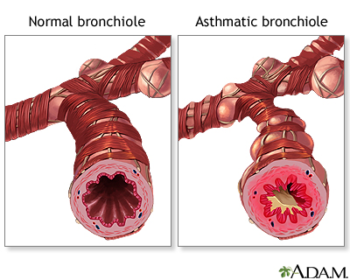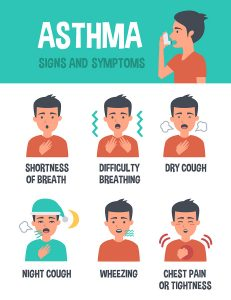LUNG Control
“Learn, Understand, Gain Control”
- Learn about Asthma
- Understand Triggers
- Gain Control over Symptoms
What is Asthma?
Asthma is a chronic, or long-term, disease that inflames and narrows the airways (bronchioles) of your lungs. Asthma causes a variety of symptoms that can worsen at any time, making breathing difficult. Asthma is a disease that cannot be cured, but it can be managed. Some days you won’t feel any asthma symptoms, but this doesn’t mean your asthma has gone away.

Frequently Asked Questions
How do I know I have asthma?
Since coughing, wheezing, and shortness of breath may be signs for other diseases, asthma must be diagnosed by a doctor through various lung tests. This may include a physical exam, pulmonary function studies, peak expiratory flow rate, chest x-ray, and oximetry.
What are the signs of asthma?
- Shortness of breath
- Difficulty breathing
- Dry Cough
- Night cough
- Wheezing
- Chest pain or tightness
- Rapid breathing
What triggers an asthma attack or episode?
- Allergies
- Respiratory infections
- Weather
- Exercising
- Smoke (either from a closeby individual smoking, or a fire)
- Strong feelings/stress
- Drugs (such as aspirin)
- Occupational Exposures
Can asthma be cured?
No. There is no known cure for asthma, however there are many ways to manage symptoms and reduce the amount of asthma attacks.
How is asthma treated?
Asthma is treated with inhaled medications prescribed by a doctor.
Can I exercise if I have asthma?
Yes. Asthma can be controlled through medications taken 15 minutes prior to exercising. There are also things that can be done to help prevent symptoms with exercise without medications. Start with a warm-up period of light activity before any harder exercise. Avoid exercising in cold and dry air. Avoid exercise when other triggers, such as respiratory infections or smoke, can cause more trouble breathing. The goal is to be able to exercise without symptoms. Most people with asthma can take part fully in sports or be as active as they would like to be.
How long do attacks or episodes last?
Attacks can last anywhere from a few minutes to several hours. During this time refer to your asthma action plan to see what medications to use, and how much.

